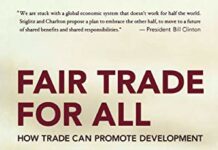
Ebook Info
- Published: 2017
- Number of pages: 515 pages
- Format: PDF
- File Size: 10.87 MB
- Authors: Joseph E. Stiglitz
Description
An International Bestseller”Accessible, provocative, and highly readable.” —Alan Cowell, New York TimesIn this crucial expansion and update of his landmark bestseller, renowned economist and Nobel Prize winner Joseph E. Stiglitz addresses globalization’s new discontents in the United States and Europe. Immediately upon publication, Globalization and Its Discontents became a touchstone in the globalization debate by demonstrating how the International Monetary Fund, other major institutions like the World Bank, and global trade agreements have often harmed the developing nations they are supposedly helping. Yet globalization today continues to be mismanaged, and now the harms—exemplified by the rampant inequality to which it has contributed—have come home to roost in the United States and the rest of the developed world as well, reflected in growing political unrest.With a new introduction, major new chapters on the new discontents, the rise of Donald Trump, and the new protectionist movement, as well as a new afterword on the course of globalization since the book first appeared, Stiglitz’s powerful and prescient messages remain essential reading.
User’s Reviews
Reviews from Amazon users which were colected at the time this book was published on the website:
⭐It takes some temerity to add yet another to 35 existing reviews of this book! But I do have a rather different reading of it. Previous reviewers seem to have thought that it was either the cat’s meow or just a venomous attack. I am somewhere in between. The book makes a number of excellent, telling points against IMF and World Bank policies and assumptions. It does this in the context of what is, indeed, a full-scale attack–no punches pulled. Stiglitz’ alternatives are not always the most viable or well-considered, either. So, three or four stars for good critique, but nothing for balance or for coherent solutions. What worries me more is Stiglitz’ lack of attention to a couple of notorious facts about the WB and IMF. He mentions them and then goes on to other things. First, these agencies have routinely supported the most unspeakably brutal and murderous dictatorships: Marcos in the Philippines, Mobutu in Zaire (now Congo), Rios Montt in Guatemala, the thugs of Sudan, the military junta in Indonesia, and on and on. They continued to do this for years after it became general knowledge that these regimes were using the loans, and other aid, to line their pockets and to buy weapons to suppress their own people–and then they ran down their countries’ health and education systems to pay back the loans. This wasn’t economic theory at work and it wasn’t ignorance. We still need a serious study of this. The notorious lack of accountability, stressed by Stiglitz, has to be remedied. Second, the World Bank in particular, and now the WTO also, have routinely gone up against the environment–though they know perfectly well that everyone, and especially the poor in the Third World, depends on the environment for survival. A highly-placed World Bank researcher (necessarily unnamed here!) told me some time ago that the World Bank’s own studies show that all their big-dam projects cost more than they produce in benefits. The costs are born by the poor (especially those displaced by the reservoirs). The benefits largely go to the rich. The WTO’s policies on “free” trade are notorious; they tolerate without protest the enormous subsidies that First World governments give their farmers (as pointed out by Stiglitz) but they won’t bend a millimetre to protect forests, fish, and wildlife that are vital to the survival of Third World poor. We need a much better study and account of all this. Whatever is going on in the non-transparent boardrooms of these agencies, the effect has been to keep the Third World in its classic position: an impoverished supplier of raw materials to the First World. The worst thing about the WB-IMF-WTO policy mix is that it routinely leads to the sacrifice not only of the environment but also of long-term investments like education. Without an educated workforce, the Third World is doomed to permanent poverty and backwardness. Everybody knows this, but the policies go on. I wish Stiglitz, or someone, would take all this on.
⭐To his credit Stieglitz paints an all too accurate picture of the failings of globalism including the exacerbation of wealth accumulated on the banking, investment, multinational side of the market. Thomas Piketty describes these investment dollars growing faster than income as well, but neither fully appreciate the sized of the liquidity drain from the consumer side off the market.Stieglitz takes the optimistic position that globalism can be fixed and fixed in such a way as to protect those who are adversely effected by the outsourcing of jobs and manufacturing including services and loss of discretionary purchasing power. He would do so with tax credits and entitlements, however. That alone confirms that globalism is not just a contemporary failure but structurally flawed and unsustainable.The book contains extensive and I would say unsubstantiated slanderous accusations against President Trump that clouds the otherwise credible evaluations of the economy. Don’t get me wrong, this appears to be the only economist willing to acknowledge the actual damage done by globalism.In listing solutions to the problems with globalization, Stieglitz faces the issue of maldistribution of capital and suggests tax reform. He does not go to the extent of taxing capital as per Piketty’s current campaign in France, but he does voice the need to tax high income, capital gains and inheritance.“Taxation is not just a matter of fairness: carrying out other parts of a successful government program to combat the adverse affects of globalization will require more revenues.”This updated analysis of globalization remains a must read for credible acknowledgement of the problems with globalism in its present form and for any appreciation for the reasons for its demise.It’s not anti imagination neo-tribalism or uneducated populism but a democratic election for an end to what has not worked for over 44 years. Populism among citizens expressed at the pols equals democracyFree trade in the time of Adam Smith did not include unbalanced trade or high tech strategic concerns, nor did he say it would work in all cases; however, It did include colonialism. Globalism has been from the start just another way for banks and multinationals to engage in the basic art of pillage and plunder. Our own citizens were victims with a massive transfer of wealth from the consumer’s market liquidity to the new oligarchs of the manufacturing and investment side — a must read.
⭐Stiglitz was Chairman of Clinton’s Council of Economic Advisors and later chief economist at the World Bank. The book provides enormous and valuable insight from someone who knows on the weaknesses of IMF and the World Bank and how they could better serve developing countries and by extension all countries. It has to be highly regarded for that contribution.This 2018 version is an update of the 2002 original. While the update was certainly necessary, it consist of adding a couple chapters and leaving the original text in tact. The book would have benefited from a comprehensive complete re-write. A current recommended reading list would have been a great addition as well.The text, particularly the update chapters, could be criticized for repeatedly blaming program failures on “corporations.” No doubt there’s blame to go around, but blaming corporations is a bit facile. They are run by people just like us, and they will and should pursue their economic interests. Stiglitz should have been more specific in attributing wrong-doing to them.Generally, I found Stiglitz an accessible and interesting author in a complex field. Some of the special case stories are a little too extended, especially the older ones. I would have preferred more explanation of some of the economic terms and analysis. For example, he says that the the difference between “investment” and “savings” amounts to the trade deficit. Well it would have been good to have some explanation of that sort of thing.
⭐As Joseph Stiglitz explains in this remarkably candid analysis, globalization (the removal of barriers of free trade and the closer integration of national economics) has, in theory, the potential to enrich everyone in the world. But, the way it has been managed, including the international trade agreements and the policies imposed on developing countries, was not less than disastrous.The main culprits for the disaster were international economic institutions: the IMF, the World Bank and the WTO.Joseph Stiglitz attacks in this book relentlessly the IMF, accusing it even of cooking the books (data and economic forecasts) in order to make its programs seem to work!It failed in its original mission of promoting global economic stability and served instead the interest of global finance.The author calls it completely incompetent (!) and its policies ‘a blend of ideology and bad economics’. With its ‘colonial mentality and social insensitivity’ it forced its catastrophic fundamentalist ‘free market dogma’ on its client states. It stressed fiscal austerity, excessively rapid privatization and market liberalization, even before social safety nets were in place as well as adequate competition and a regulatory framework. Its policies were probably the single most important cause of recessions in many countries!Politically speaking, the IMF is not democratic. Its actions affect the lives of billions throughout the developing world, but those voices are not heard. On the contrary, bankers who insist on getting repaid are very well represented through the finance ministers and central bank governors.Joseph Stiglitz calls for a change in IMF governance via a change in voting rights.In the short run, he asks complete transparency and, for every intervention, a report on the expected poverty and unemployment impact of its programs in order to force it to be more responsive to the poor, to the environment, to broader political and social and concerns.Stiglitz stresses rightly that development is about transforming societies, improving the lives of the poor and enabling everyone to have a chance at success and access to health care and education.But for the World Bank, commercial and financial interests supersede concern for the environment, democracy, human rights and social justice: billions of dollars were available to bail out banks, but not the paltry sums needed to provide food subsidies for those thrown out of work!Western hypocrisy is totally blatant in the different WTO rounds. Western countries pushed poor countries to eliminate trade barriers, but kept their own barriers, preventing developing countries from exporting their agricultural products. More, they ensured that they garner a disproportionate share of the benefits of trade liberalization with the ultimate result that some of the poorest countries in the world were actually made worse off (!), e.g., the agreements on intellectual property rights had as a consequence that drugs were not available any more in poor countries at affordable prices: thousands were effectively condemned to death.For Stiglitz, systems of global governance are essential and he proposes that the existing institutions return to their initial responsibilities: the UN for global political security, the IMF for global economic stability and the World Bank for ‘human’ economic development.This is a book of a superb free mind and a must read for all those interested in world politics.I also recommend in the same vein, the book of Robert Heilbroner ‘Behind the veil of economics’ and the works of Robert Kuttner. For a voice from the South, see Walden Bello’s incisive ‘Dilemmas of Domination’.
⭐Joseph Stiglitz never disappoints. At his best here, he uses simple, clear language and impeccable logic to analyse the reasons why there is so much discontent with globalisation. Reading him always gives the feeling he has looked out the window and is speaking of the real world, particularly if – like me – you live in one of those countries that is at the bottom of all the listings.
⭐When I order books from amazon the paper quality is way lower than when I order them from a physical shop. This is no exception. I cannot highlight a page without the highlighter showing through into the text behind.
⭐Fantastic read, recommend it to anyone who think that all brexiters are racist bigots as it does show a relevance in EU history that is educated and open to debate.
⭐A well written book-a bit technical fro non economists.
Keywords
Free Download Globalization and Its Discontents Revisited: Anti-Globalization in the Era of Trump in PDF format
Globalization and Its Discontents Revisited: Anti-Globalization in the Era of Trump PDF Free Download
Download Globalization and Its Discontents Revisited: Anti-Globalization in the Era of Trump 2017 PDF Free
Globalization and Its Discontents Revisited: Anti-Globalization in the Era of Trump 2017 PDF Free Download
Download Globalization and Its Discontents Revisited: Anti-Globalization in the Era of Trump PDF
Free Download Ebook Globalization and Its Discontents Revisited: Anti-Globalization in the Era of Trump





